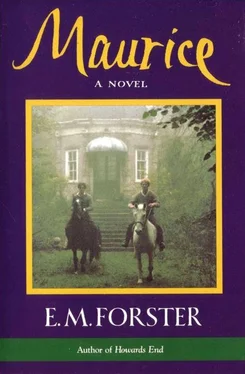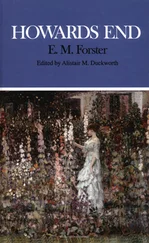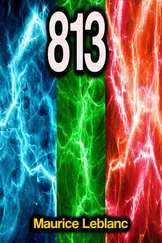"God, why there's that keeper chap again!"
"Couldn't be, couldn't have got here. We left him up at the house."
"He could have if he'd run."
"Why should he have run?"
"That's true, why should he have?" said Maurice, then lifted the flap at the back of the brougham and peered through it into the rose bushes, which a haze already concealed.
"Was it?"
"I couldn't see." His companion resumed the narrative at once, and talked almost without ceasing until they parted at Waterloo.
In the taxi Maurice read over his statement, and its frankness alarmed him. He, who could not trust Jowitt, was putting himself into the hands of a quack; despite Risley's assurances, he connected hypnotism with seances and blackmail, and had often growled at it from behind the Daily Telegraph; had he not better retire?
But the house seemed all right. When the door opened, the little Lasker Joneses were playing on the stairs — charming children, who mistook him for "Uncle Peter", and clung to his hands; and when he was shut into the waiting room with Punch the sense of the normal grew stronger. He went to his fate calmly. He wanted a woman to secure him socially and diminish his lust and bear children. He never thought of that woman as a positive joy — at the worst, Dickie had been that — for during the long struggle he had forgotten what Love is, and sought not happiness at the hands of Mr Lasker Jones, but repose.
That gentleman further relieved him by coming up to his idea of what an advanced scientific man ought to be. Sallow and expressionless, he sat in a large pictureless room before a roll-top desk. "Mr Hall?" he said, and offered a bloodless hand. His accent was slightly American. "Well, Mr Hall, and what's the trouble?" Maurice became detached too. It was as if they met to discuss a third party. "It's all down here," he said, producing the statement. "I've consulted one doctor and he could do nothing. I don't know whether you can."
The statement was read.
"I'm not wrong in coming to you, I hope?"
"Not at all, Mr Hall. Seventy-five per cent of my patients are of your type. Is that statement recent?"
"I wrote it last night."
"And accurate?"
"Well, names and place are a bit changed, naturally."
Mr Lasker Jones did not seem to think it natural. He asked several questions about "Mr Cumberland", Maurice's pseudonym for Clive, and wished to know whether they had ever united: on his lips it was curiously inoffensive. He neither praised nor blamed nor pitied: he paid no attention to a sudden outburst of Maurice's against society. And though Maurice yearned for sympathy — he had not had a word of it for a year — he was glad none came, for it might have shattered his purpose.
He asked, "What's the name of my trouble? Has it one?"
"Congenital homosexuality."
"Congenital how much? Well, can anything be done?"
"Oh, certainly, if you consent."
"The fact is I've an old-fashioned prejudice against hypnotism."
"I'm afraid you may possibly retain that prejudice after trying, Mr Hall. I cannot promise a cure. I spoke to you of my other patients — seventy-five per cent — but in only fifty per cent have I been successful."
The confession gave Maurice confidence, no quack would have made it. "We may as well have a shot," he said, smiling. "What must I do?"
"Merely remain where you are. I will experiment to see how deeply the tendency is rooted. You will return (if you wish) for regular treatment later. Mr Hall! I shall try to send you into a trance, and if I succeed I shall make suggestions to you which will (we hope) remain, and become part of your normal state when you wake. You are not to resist me."
"All right, go ahead."
Then Mr Lasker Jones left his desk and sat in an impersonal way on the arm of Maurice's chair. Maurice felt he was going to have a tooth out. For a little time nothing happened, but presently his eye caught a spot of light on the fire irons, and the rest of the room went dim. He could see whatever he was looking at, but little else, and he could hear the doctor's voice and his own. Evidently he was going into a trance, and the achievement gave him a feeling of pride.
"You're not quite off yet, I think."
"No, I'm not."
He made some more passes. "How about now?"
"I'm nearer off now."
"Quite?"
Maurice agreed, but did not feel sure. "Now that you're quite off, how do you like my consulting-room?"
"It's a nice room."
"Not too dark?"
"Rather dark."
"You can see the picture though, can't you?"
Maurice then saw a picture on the opposite wall, yet he knew that there was none.
"Have a look at it, Mr Hall. Come nearer. Take care of that crack in the carpet though."
"How broad is the crack?"
"You can jump it."
Maurice immediately located a crack, and jumped, but he was not convinced of the necessity.
"Admirable — now what do you suppose this picture is of, whom is it of —?"
"Whom is it of —"
"Edna May."
"Mr Edna May."
"No, Mr Hall, Miss Edna May."
"It's Mr Edna May."
"Isn't she beautiful?"
"I want to go home to my mother." Both laughed at this remark, the doctor leading.
"Miss Edna May is not only beautiful, she is attractive."
"She doesn't attract me," said Maurice pettishly.
"Oh Mr Hall, what an ungallant remark. Look at her lovely hair."
"I like short hair best."
"Why?"
"Because I can stroke it — " and he began to cry. He came to himself in the chair. Tears were wet on his cheeks, but he felt as usual, and started talking at once.
"I say, I had a dream when you woke me up. I'd better tell it you. I thought I saw a face and heard someone say, "That's your friend. Is that all right? I often feel it — I can't explain — sort of walking towards me through sleep, though it never gets up to me, that dream."
"Did it get near now?"
"Jolly near. Is that a bad sign?"
"No, oh no — you're open to suggestion, you're open — I made you see a picture on the wall."
Maurice nodded: he had quite forgotten. There was a pause, during which he produced two guineas, and asked for a second appointment. It was arranged that he should telephone next week, and in the interval Mr Lasker Jones wanted him to remain where he was in the country, quietly.
Maurice could not doubt that Clive and Anne would welcome him, nor that their influence would be suitable. Penge was an emetic. It helped him to get rid of the old poisonous life that had seemed so sweet, it cured him of tenderness and humanity. Yes, he'd go back, he said: he would wire to his friends and catch the afternoon express.
"Mr Hall, take exercise in moderation. A little tennis, or stroll about with a gun."
Maurice lingered to say, "On second thoughts perhaps I won't go back."
"Why so?"
"Well, it seems rather foolish to make that long journey twice in a day."
"You prefer then to stop in your own home?"
"Yes — no — no, all right, I will go back to Penge."
37
On his return he was amused to find that the young people were just off for twenty-four hours' electioneering. He now cared less for Clive than Clive for him. That kiss had disillusioned. It was such a trivial prudish kiss, and alas! so typical. The less you had the more it was supposed to be — that was Clive's teaching. Not only was the half greater than the whole — at Cambridge Maurice would just accept this — but now he was offered the quarter and told it was greater than the half. Did the fellow suppose he was made of paper?
Clive explained how he wouldn't be going had Maurice held out hopes of returning, and how he would be back for the match any way. Anne whispered, 'Was the luck good?" Maurice replied, "So-so," whereupon she covered him with her wing and offered to invite his young lady down to Penge. "Mr Hall, is she very charming? I am convinced she has bright brown eyes." But Clive called her off, and Maurice was left to an evening with Mrs Durham and Mr Borenius.
Читать дальше












